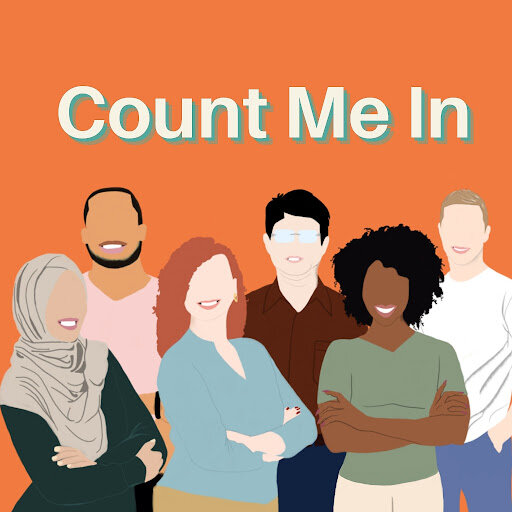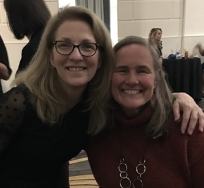In this series of posts, we’ll be featuring mathematical podcasts from all over the internet, by speaking to the creators of the podcast and asking them about what they do.
We spoke to Della Dumbaugh and Deanna Haunsperger about their podcast, Count Me In with Della and Deanna.

Podcast title: Count Me In with Della and Deanna
Website: Math Values Blog
Links: Spotify, Apple Podcasts
Average episode length: 57 minutes
Recommended episode: Season 1 Episode 1: Talithia Wiliams
How did your podcast start?
In the spring of 2021, we finished editing our book Count Me In: Community and Belonging in Mathematics (to appear in spring 2022) which highlights the stories of twenty-six diverse communities in mathematics. These communities show the power of belonging to a community to help anyone, particularly women and members of groups underrepresented in mathematics, to see themselves as mathematicians. One day we were out for a walk when Della insisted that Deanna hear her out on her grand idea that grew out of the book: a podcast which would show the humanity of mathematics by interviewing mathematicians and showing them as complete human beings who are vulnerable and had obstacles to overcome on their way to becoming mathematicians. Deanna thought it was brilliant.
Two months later we had found someone to explain podcasting to us and who would do production, and we started interviewing mathematicians from all walks of life and stages of their careers. We asked them about growing up, times they didn’t feel like they belonged, hardships they had overcome, how they found their community, how they take care of themselves, and a few fun lightning questions at the end.
Who is the intended audience for the podcast? Who should listen?
The podcast is for anyone who loves mathematics. It’s for anyone who has ever wondered if they could be a mathematician. It’s for anyone who has ever assumed that for some the road to becoming a mathematician was completely smooth.
Mathematicians can learn that they are not alone in their joy of mathematics or in some of the struggles they have encountered along their journey. Teachers can ask their students to listen and write about experiences the students have had which are similar to the mathematicians’ so that they can begin to see mathematics is a possibility for them, too.
What are some of the stories you have found compelling so far?
Colleagues recounted stories about the strength of their family as they transitioned from a two-room adobe hut in Mexico to a farming community in western Nebraska, how mathematics itself or important people in their lives helped them overcome struggles, how they found others who shared their joy in mathematics, how they came up with a clever way to make themselves invaluable to a study group in graduate school, how their cats or hockey or their faith keep them grounded, how potato chips helped them compete in a Mathematical Olympiad, and how all teachers can help build community in their classrooms. They were vulnerable and allowed us to see their very human selves.
What are your plans for the future?
Our eight-episode Season 2 is being audiotaped right now. We’re very excited about the stories of the people whom we are interviewing!
